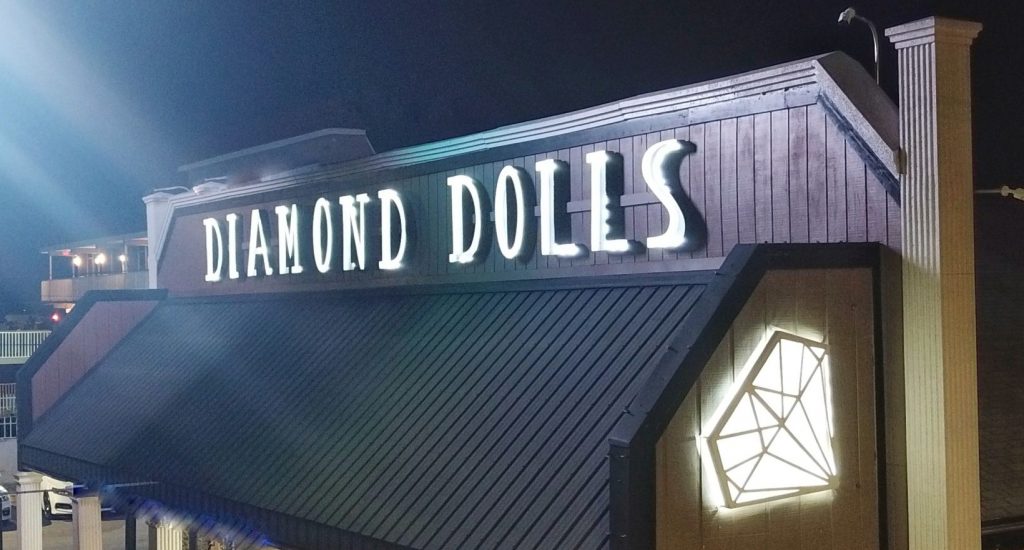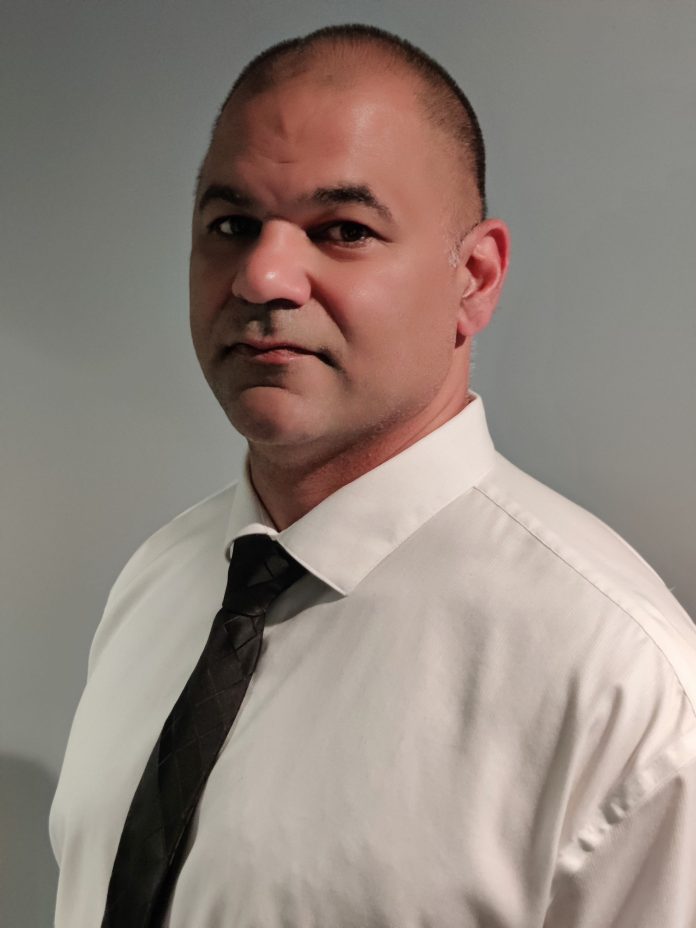(Note: This story appears in the May 2021 issue of ED Magazine)
*Story by Larry Kaplan
If it seems Murray Zal has tunnel vision as far as the clubs he oversees as operations manager for Jim Dato’s clubs, it’s because he does.
An injury and his employer’s departure from Tampa 18 years ago led Murray Zal to make an advantageous move from corporate America to the adult nightclub industry. Zal’s mother and sister had club bartending experience, so despite never having been a customer, he knew the clubs could be lucrative and wanted to give bartending a shot.
Zal filled a barback opening at Clearwater’s Oz and, within two weeks, was promoted to floor manager. Eight months later, he assumed the general manager’s title. He’s held GM positions ever since, until assuming his current operations manager title for Jim Dato’s clubs.
ED’s Legal Correspondent Larry Kaplan caught up with Zal to find what made him such a complementary piece to Dato’s club puzzle.
ED: The adult nightclub industry must have been quite a change from driving for a cookie and cracker supplier?
ZAL: I’m as far from being a strip club or bar customer as you get. I barely drink, and I’ve never done drugs. I’ve always looked at this as all business, never as a place to hang out or hook up. I’m a family guy, always busy with my wife and kids. I believe that’s why I’ve been successful. I don’t get distracted by a lot of what I see as some others do. I’m focused on making money, running most efficiently, and the ideal types of promotion and marketing.
ED: Is the most important task of managers and staff to make the mood of the club?
ZAL: I often tell our staff, our job is to throw the party, not be the party. Our job is to sell the fantasy, put the energy in the air. They should enjoy coming to work and letting that radiate to customers but not get intoxicated. If the staff gets drunk, the manager isn’t doing their job.
ED: You oversee Jim Dato’s four clubs. What does a typical week look like for you?
ZAL: I handle the day-to-day operations of the clubs: hiring, firing, advertising, and marketing. My week is typically, without exaggerating, 24/7. Every day is different with new problems; it’s never mundane. I have both work and personal cell phones. I must always be available because I’m also our IT guy. When there’s a problem, it goes up the food chain, and if the GM feels I should handle it, he’ll call, any time, any day. I alternate between our two counties. Tuesdays, I do the ordering with the daytime managers. I take care of the ATMs, meet with the GMs working those nights, discuss promotions and what’s going on. I observe everything, but I don’t micro-manage. Unless it’s an extreme situation, I’ll never give corrections to a staff member. I go to my manager, that’s his job. My job is to ensure he’s doing his job. His job is to ensure they’re doing their jobs.
The clubs are a reflection of how I’d want them run if I was running them. It’s essential to set that expectation with your managers and monitor their follow-through. We’ve started to implement an employee handbook with protocols. If managers call the police, they must write an incident report and notify me. Coming from the corporate world, I felt we could incorporate set rules to protect us, liability-wise, and make staff more conscientious of their behaviors. Do they want to write an incident report because they made a poor decision?
I tell our managers that they’re not doing their jobs unless they’re setting expectations for staff to do their jobs correctly. Without direction, staff’s perception of expectations is highly subjective, especially if they’ve worked at other clubs.
“I’m as far from being a strip club or bar customer as you get. I barely drink, and I’ve never done drugs. I’ve always looked at this as all business, never as a place to hang out or hook up. I’m a family guy, always busy with my wife and kids. I believe that’s why I’ve been successful. I don’t get distracted by a lot of what I see as some others do. I’m focused on making money, running most efficiently, and the ideal types of promotion and marketing.” — Murray Zal
ED: How is working for Jim different from other club owners for whom you’ve managed?
ZAL: When I first started, we hadn’t known each other, but we quickly built a good relationship. If you want an employer to give you the latitude to make changes, you must prove competence. Jim had been successful and was pretty set in his ways. Some of my proposed changes were very foreign to him. Over time, little by little, the results of small changes I’d implemented led the trust relationship to grow. Today, I think Jim views me as a son. We talk every day. He now just lets me do my thing on the bigger stuff. That kind of trust to not micromanage, knowing I’ll do the right things for the company, is something I’ve never experienced to this degree.
When I first started, Jim was in the clubs three to four nights a week. Now he’s freed up to do more of the behind-the-scenes tasks and come and go as he pleases. He knows I’ll keep him abreast of anything important. Jim doesn’t have the sort of ego that demands that he be upfront. He’s much happier behind the scenes.
ED: What traits do you look for when hiring employees?
ZAL: I try to hire outside the industry. I look for serious family people who wouldn’t get into the industry to party or hook up but appreciate the earning potential. My managers know that fraternizing or hanging out with staff or entertainers can lead to termination.
ED: What is it like working in Clearwater/Pinellas County and Pasco County? What challenges do they present? How have you overcome said challenges?
ZAL: When I first started, I focused solely on fixing Diamond Dolls. The Westshore Tampa clubs serve a much more affluent clientele than the Pinellas clubs. Oz in Pinellas, my first club, focused on local business travelers rather than regulars. Diamond Dolls, on the other hand, cultivated regulars. I felt we could add to that without making it a Tampa club or Oz. We expanded what was then called “Cheers with tits” to also attract first-time customers. The challenge was to grow the base of more blue-collar, working-class Pinellas guys while also making it more welcoming to first-time customers. It required getting the right staff members. Working at reaching and cultivating the demographically correct clientele we were shooting for and once we got them in, making them into regulars. We achieved that and are expanding on it, even today.
Pasco was different. It was like the Wild West. There was a lot of cleanup of the staff, management, and clientele required. It’s now light years from where it was when I started. The buildings are brighter. The overall mood is better. We changed the clientele by changing the music and the dress code. Our people do a great job. I guarantee you’ll feel comfortable going into our Pasco clubs today and bringing a woman, which I believe is the sign of a good club.
ED: What about security issues?
ZAL: Our Pasco problems have disappeared. It’s all in training. I preach deescalation; it’s all about your approach. I tell our guys to approach situations like they’re the guest’s friend, calm them down and get them out the door. Over 90% of problems are resolvable without putting hands on the guest if you approach it correctly. It’s the hotheads who think it’s cool to throw blows who get both themselves and the club in trouble. The club’s liability is the worst part; it’s hard to get insurance these days. Many owners fail to preach liability to their staff. Right or wrong doesn’t matter—what matters is getting sued.
ED: How did you connect with Jim?
ZAL: I reached out to him through a mutual acquaintance. He knew a little about my background, and I offered my services as a consultant. I was doing well at real estate and not looking for a full-time job. I told him there was no doubt that I could make him more money based on his current management. That arrangement lasted all of a few weeks until he asked me to work full-time as his operations manager, a new position he created for me. I accepted and let the real estate go.

ED: Diamond Dolls was the first Pinellas club to reopen amid COVID-19. How did you accomplish that?
ZAL: When we were forced to close, I went through the laws and came up with an idea to reopen. Restaurants that generated more than 50% of revenues from selling food for on-premise consumption could operate. A kitchen wasn’t required. I looked up the FDA’s definition of potato chips, and they’re considered a food. By selling small bags of chips for $6 and drinks for less, we could meet the threshold. I ran the idea of selling chips by Jim and our attorney, Luke Lirot. We opened with chips and were visited daily by state inspectors. We provided them printouts of the laws to show that we were operating 100% legally. The inspectors were receiving tremendous pressure from above to sanction us. To help alleviate their pressure, we bought an air fryer and added frozen pizzas. We did great, partially because we were the only open club in town for a while.
ED: What is the best part of your job? What is the hardest part?
ZAL: Problem-solving, teaching, and building relationships with my managers are the best parts. The worst part, as a family man with growing kids, is the industry’s stigma. Our clubs don’t exemplify that stigma, but if people know you run clubs, they’re automatically prejudged.
ED: What did you bring from prior work experience that’s helped you as a GM & Operations Manager?
ZAL: I’ve owned and operated sports bars, restaurants, and other businesses and delivered and merchandised cookies for Nabisco/Kraft Foods, a huge national company. Nabisco was very structured. Bringing that structure to our industry was very beneficial. Ultimately, people like structure. When they understand their expectations, it dramatically alleviates stress. My previous ownership experience taught me not to waste money and maximizing return. Rather than just directing our people to do things, I believe in explaining why they are doing those tasks. That gets them invested, and you’ll get more out of them. That’s benefited us on liability, wasteful spending, and other areas.
ED: If you had several club GMs in a room and could share some advice, what would you like to tell them?
ZAL: Don’t play where you work. Treat it like a business. Respect your entertainers and staff, be positive, patient, and never condescending. If they don’t do drugs, don’t steal, and don’t sleep with entertainers, they’re 70% of the way there.
Larry Kaplan has for 20 years been the Legal Correspondent for ED Publications. Mr. Kaplan is a business broker in the sale and purchase of adult nightclubs and adult retail stores and the Executive Director of the ACE of Michigan adult nightclub state trade association. Contact Larry Kaplan at 313-815-3311 or email larry@kaplanclubsales.com.





























